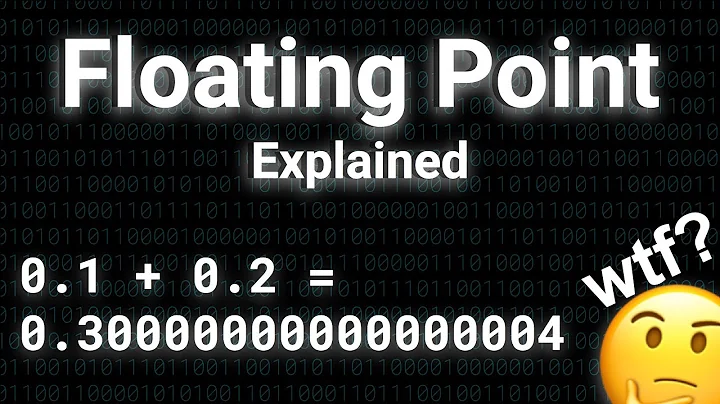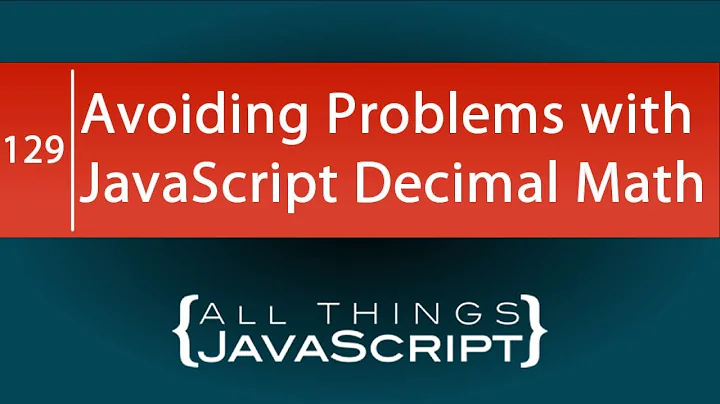Dealing with float precision in Javascript
Solution 1
From this post: How to deal with floating point number precision in JavaScript?
You have a few options:
- Use a special datatype for decimals, like decimal.js
- Format your result to some fixed number of significant digits, like this:
(Math.floor(y/x) * x).toFixed(2) - Convert all your numbers to integers
Solution 2
You could do something like this:
> +(Math.floor(y/x)*x).toFixed(15);
1.2
Edit: It would be better to use big.js.
big.js
A small, fast, easy-to-use library for arbitrary-precision decimal arithmetic.
>> bigX = new Big(x)
>> bigY = new Big(y)
>> bigY.div(bigX).round().times(bigX).toNumber() // => 1.2
Solution 3
> var x = 0.1
> var y = 0.2
> var cf = 10
> x * y
0.020000000000000004
> (x * cf) * (y * cf) / (cf * cf)
0.02
Quick solution:
var _cf = (function() {
function _shift(x) {
var parts = x.toString().split('.');
return (parts.length < 2) ? 1 : Math.pow(10, parts[1].length);
}
return function() {
return Array.prototype.reduce.call(arguments, function (prev, next) { return prev === undefined || next === undefined ? undefined : Math.max(prev, _shift (next)); }, -Infinity);
};
})();
Math.a = function () {
var f = _cf.apply(null, arguments); if(f === undefined) return undefined;
function cb(x, y, i, o) { return x + f * y; }
return Array.prototype.reduce.call(arguments, cb, 0) / f;
};
Math.s = function (l,r) { var f = _cf(l,r); return (l * f - r * f) / f; };
Math.m = function () {
var f = _cf.apply(null, arguments);
function cb(x, y, i, o) { return (x*f) * (y*f) / (f * f); }
return Array.prototype.reduce.call(arguments, cb, 1);
};
Math.d = function (l,r) { var f = _cf(l,r); return (l * f) / (r * f); };
> Math.m(0.1, 0.2)
0.02
You can check the full explanation here.
Solution 4
Check out this link.. It helped me a lot.
http://www.w3schools.com/jsref/jsref_toprecision.asp
The toPrecision(no_of_digits_required) function returns a string so don't forget to use the parseFloat() function to convert to decimal point of required precision.
Related videos on Youtube
Jeroen Ooms
#rstats developer and staff RSE for @ropensci at UC Berkeley.
Updated on October 06, 2021Comments
-
 Jeroen Ooms over 2 years
Jeroen Ooms over 2 yearsI have a large amount of numeric values
yin javascript. I want to group them by rounding them down to the nearest multiple ofxand convert the result to a string.How do I get around the annoying floating point precision?
For example:
0.2 + 0.4 = 0.6000000000000001Two things I have tried:
>>> y = 1.23456789 >>> x = 0.2 >>> parseInt(Math.round(Math.floor(y/x))) * x; 1.2000000000000002and:
>>> y = 1.23456789 >>> x = 0.2 >>> y - (y % x) 1.2000000000000002-
 Vatev almost 12 yearsThis is actually normal behavior for
Vatev almost 12 yearsThis is actually normal behavior fordoubleyou just don't see it in print statements in most languages. Have you tried rounding your numbers? -
Pointy almost 12 yearsYou can't really "get around" it, as it's an intrinsic aspect of binary floating-point math systems. That's true for both your "x" and your "y" values, apparently; if "x" is 0.3 that can't be represented exactly. "Rounding" to arbitrary fractions is going to result in imprecision.
-
 Jeroen Ooms almost 12 yearsSo what would be an alternative way of converting
Jeroen Ooms almost 12 yearsSo what would be an alternative way of convertingyto"1.2". -
 pilau almost 10 years@Jeroen I'm sure you've got it already, but just for the record,
pilau almost 10 years@Jeroen I'm sure you've got it already, but just for the record,Math.floor(y). -
 Josh1billion about 8 years@pilau that would result in 1, not 1.2
Josh1billion about 8 years@pilau that would result in 1, not 1.2 -
 santiago arizti over 4 years
santiago arizti over 4 yearsMath.floor(y*10)/10?
-
-
 Jeroen Ooms almost 12 yearsDoesn't work for all combinations
Jeroen Ooms almost 12 yearsDoesn't work for all combinationsyandx. -
 Jeroen Ooms almost 12 yearsThis gets a bit problematic of
Jeroen Ooms almost 12 yearsThis gets a bit problematic ofxis an integer. -
Karl over 9 years"Convert all your numbers to integers", I've wondered about this. As we know, JavaScript has one number type
Number, an IEEE 754 float. If that's the case, then why does converting a float to an integer work, (and it does)? Does JavaScript actually have an integer data type that simply isn't accessible via a reserved word? -
rich remer over 8 yearsIEEE 754 can exactly represent integers up to something like 2^50. So, if you're working within a known range, you can scale your values to take advantage of the 50 bits (or whatever) of precision, instead of wasting the precision normally reserved for large numbers.
-
paul23 over 6 years@richremer a floating point has the property that the accuracy (for normal values) does not depend on the size. - So whether you convert it to integers (by say multiplying the values with some constant) the accuracy is equal.
-
prahaladp about 6 yearsIf you happened to be someone who downvoted me for this answer, could you please explain why ? (the solution provided seems to work )
-
dopatraman over 5 yearstoFixed returns a string
-
 joe cool about 5 yearsMath.m(0.07, 100) => 7.000000000000002
joe cool about 5 yearsMath.m(0.07, 100) => 7.000000000000002 -
Rivenfall almost 4 yearsThe number of "significant digits" is the number of digits using the scientific notation (no leading or trailing zeros) and it's a choice based on circumstances. - toPrecision's argument seems to be a number of significant digits. - toFixed is for a number of trailing digits.
-
Rivenfall almost 4 yearsreplace floor by round,
+by parseFloat and 15 by a lower number if you can (toFixed argument could be calculated based on x) -
Rivenfall almost 4 yearsBasically the problem is this, you have js numbers y and x and you want the nearest (from y) multiple of x. The toPrecision method doesn't help i.e.
parseFloat((150).toPrecision(1)) === 200 -
 jefelewis over 3 yearstoFixed() will convert the number to a string.
jefelewis over 3 yearstoFixed() will convert the number to a string. -
shaiis.com over 3 yearsThis is not working!
-
Tchakabam over 2 yearsdoing string/float-parsing conversion for a rounding problem isn't exactlxy what I would call performing at scale :D (better: implement/use a toPrecision function that operates/returns solely on numbers!)





